Fajita Spice Ingredients: A Spicy Fiesta in Your Pantry 🌮🔥
So you’ve decided it’s time to turn up the heat in your kitchen? Welcome to the wonderful world of fajita spice ingredients, where every sprinkle brings your food closer to that smoky, zesty, street-taco magic.
In this article, we’re diving deep into what makes fajitas sing — from the basics like chili powder and cumin, to those secret players like smoked paprika and lime zest. Whether you’re a seasoned chef or a curious home cook, you’ll find practical spice hacks, ingredient breakdowns, and a few spicy jokes along the way.
Contents
- What Exactly Are Fajita Spice Ingredients?
- Core Components of a Classic Fajita Mix
- Optional Add-Ons for Flavor Enthusiasts
- Spice Comparison Table: Essential vs. Optional Ingredients
- Pro Tips for Mixing Your Own Fajita Spice Blend
- Visual Guide: How Fajita Spices Transform Your Dish
- Common Mistakes to Avoid When Using Fajita Spices
- Conclusion: Spice Up Your Life with Homemade Fajita Magic
What Exactly Are Fajita Spice Ingredients?
If you’ve ever had authentic Tex-Mex fajitas, you know the aroma hits you before you even see the plate. That’s the power of a good fajita spice blend. But what exactly goes into it?
The short answer: a mix of warm, earthy, and slightly smoky flavors designed to enhance meats and vegetables without overpowering them. The long answer? It’s more science than guesswork. Each spice plays a role — some bring heat, others add depth, and a few are just there to make your mouth go, “Whoa!”
Core Components of a Classic Fajita Mix
Let’s start with the holy trinity of fajita spices:
- Chili Powder – The backbone of any good fajita blend. Adds mild heat and color.
- Cumin – Earthy, nutty, and absolutely essential. This is what gives fajitas their signature Tex-Mex depth.
- Paprika – Smoked or sweet? Both work, but smoked paprika adds that grilled flavor reminiscent of street vendor carts.
These three ingredients form the base layer of flavor. Think of them as the rhythm section of a rock band — not flashy on their own, but vital for harmony.
Optional Add-Ons for Flavor Enthusiasts
Want to take your fajita game to the next level? Here are some optional ingredients that can really punch things up:
- Garlic Powder – For a savory umami kick.
- Onion Powder – Adds sweetness and complexity.
- Oregano – Mexican oregano is preferred over Mediterranean if you can find it — it’s more floral and less bitter.
- Lime Zest or Citric Acid – Brightens up the whole dish. Just a pinch does wonders.
- Cayenne Pepper – For those who want extra fire without losing the balance.
- Black Pepper – Enhances absorption of other spices and adds a slight bite.
- Coriander – Often overlooked, but it brings a citrusy note that cuts through richer meats.
Think of these as your lead guitar soloists — they can steal the show if used wisely, but too much and things get messy.
Spice Comparison Table: Essential vs. Optional Ingredients
| Ingredient | Type | Flavor Profile | Heat Level | Best For |
|---|---|---|---|---|
| Chili Powder | Essential | Earthy, Mildly Spicy | Mild | Base flavor, color |
| Cumin | Essential | Nutty, Warm | None | Depth, authenticity |
| Smoked Paprika | Essential | Smoky, Sweet | None | Grilled flavor simulation |
| Garlic Powder | Optional | Savory, Umami | None | Meat enhancement |
| Oregano (Mexican) | Optional | Herbaceous, Floral | None | Balance, brightness |
| Cayenne Pepper | Optional | Hot, Sharp | High | Extra heat lovers |
| Lime Zest | Optional | Zesty, Citrusy | None | Refreshing contrast |
Pro Tips for Mixing Your Own Fajita Spice Blend
Making your own spice mix is easy — and totally worth the effort. Here’s how to nail it every time:
- Use Fresh Spices – Old spices lose potency. If your spices look dusty, it’s time for a refresh.
- Bloom the Spices – Toast them lightly in oil before using to unlock deeper flavors. Don’t burn them though — that’s a one-way ticket to bitter town.
- Keep Ratios Balanced – Start with equal parts chili powder, cumin, and paprika. Then adjust based on taste.
- Make a Big Batch – Double or triple the recipe and store in an airtight container. You’ll be glad you did when taco Tuesday rolls around.
- Label Everything – Especially if you tweak the blend. Note down ratios and variations so you can replicate success (or avoid past mistakes).
Visual Guide: How Fajita Spices Transform Your Dish
We’ve included a visual journey to show you how adding fajita spices at different stages affects the final dish. Below are five key images that demonstrate the process:
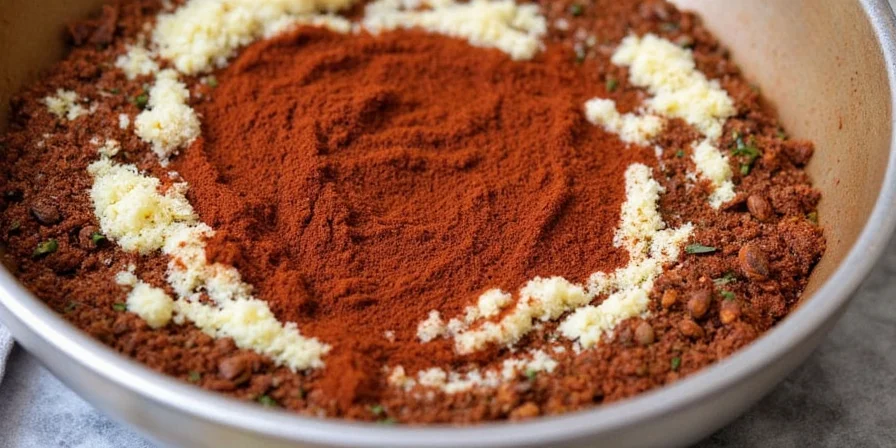 Raw chicken before spice application
Raw chicken before spice application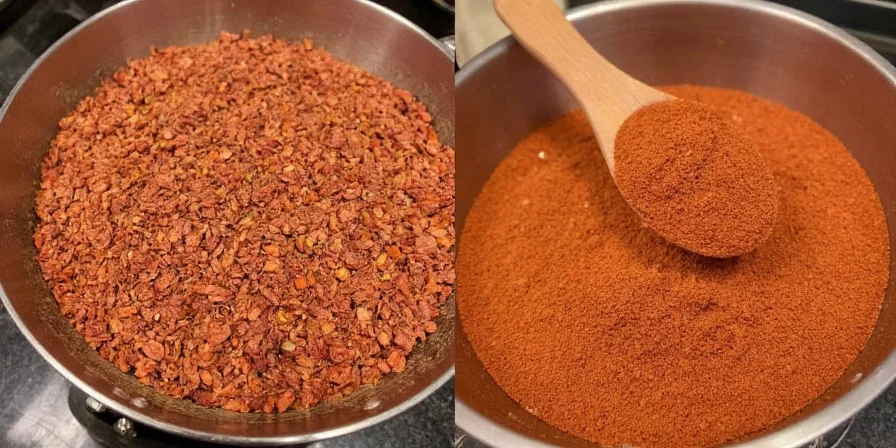 Meat marinated with fajita spices
Meat marinated with fajita spices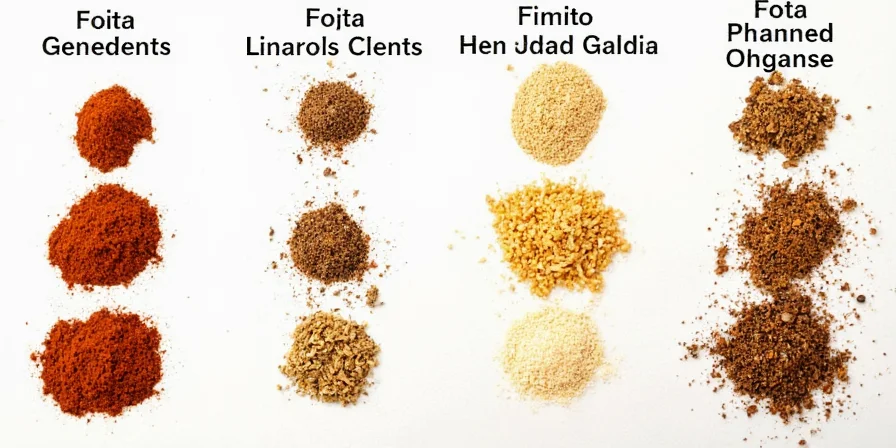 Peppers and onions caramelizing with spice dust
Peppers and onions caramelizing with spice dust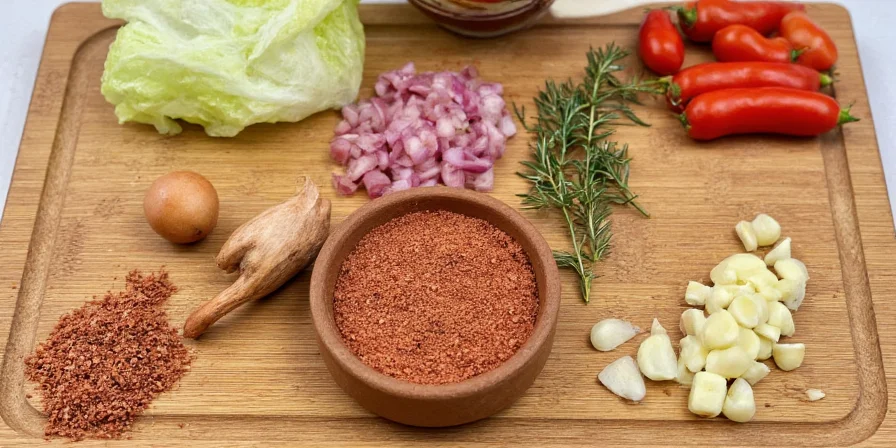 Plated fajitas ready to eat
Plated fajitas ready to eat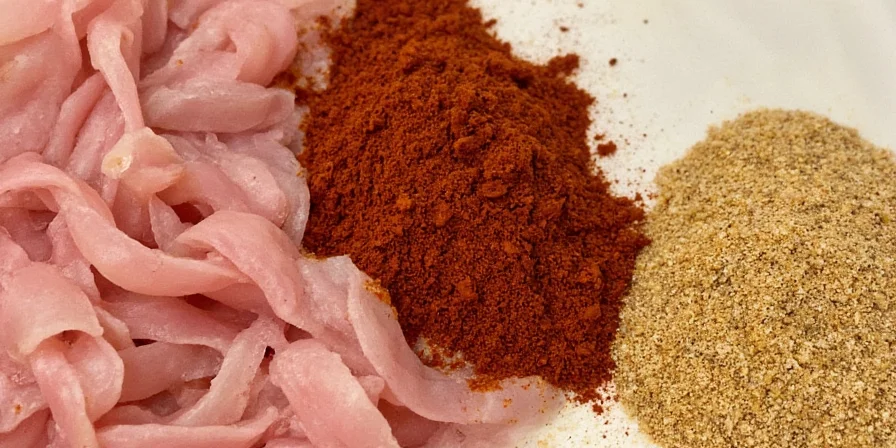 Close-up of homemade spice blend
Close-up of homemade spice blend
Each photo captures a moment in the transformation, proving that the right spice blend turns simple ingredients into something extraordinary.
Common Mistakes to Avoid When Using Fajita Spices
Even pros make missteps in the spice department. Here are the most common ones to watch out for:
- Overloading the Mix – Too many spices can clash instead of complement each other.
- Using Bitter Oils – Some oils burn quickly and ruin your toasted spices. Stick with high smoke point oils like avocado or grapeseed oil.
- Not Letting the Meat Rest – Seasoned meat should rest after cooking. Otherwise, all those spices run off with the juices.
- Adding All at Once – Layer your spices: some during marinating, some while searing, and a final sprinkle before serving for maximum impact.
- Forgetting the Tortilla – The humble tortilla is the unsung hero. Brush it with oil and toast it briefly to enhance its flavor and hold up against juicy fillings.
Conclusion: Spice Up Your Life with Homemade Fajita Magic
Mastering fajita spice ingredients isn’t about following a strict formula — it’s about understanding how each component contributes to the overall flavor experience. By learning which spices play well together, adjusting to your taste preferences, and avoiding common pitfalls, you can elevate your home-cooked fajitas to professional-level deliciousness.
Whether you're making them for family dinners, backyard gatherings, or a solo cheat meal, having your own custom spice blend means you’re never more than 10 minutes away from flavor-packed perfection.
So go ahead — raid your pantry, grab your whisk, and let’s make some seriously spicy magic happen. And remember: the best spice blend is the one that makes your kitchen smell like a fiesta.
¡Buen provecho!

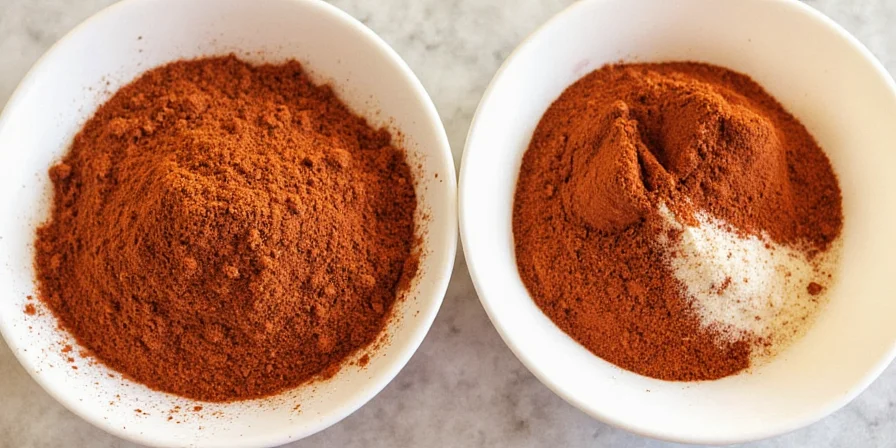









 浙公网安备
33010002000092号
浙公网安备
33010002000092号 浙B2-20120091-4
浙B2-20120091-4